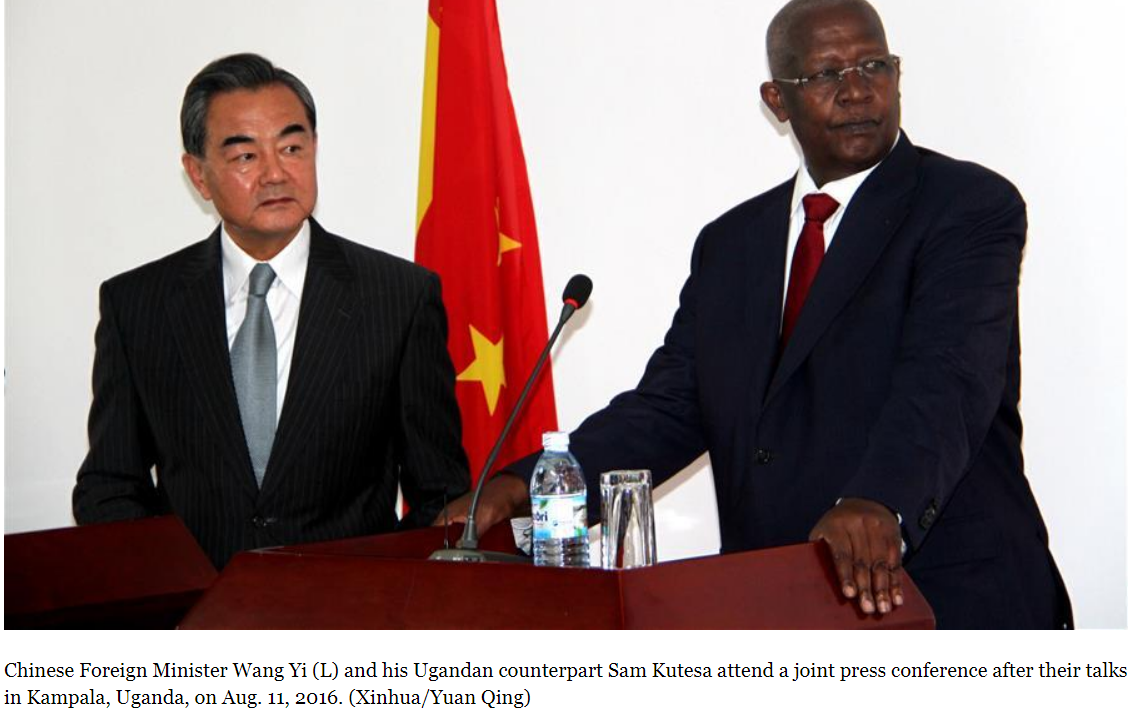Almost a fortnight after Foreign Affairs Minister Sam Kuteesa was named among powerful world politicians with offshore companies that avoid taxes named in “Paradise Papers”, the man from Sembabule is being probed by the United States over receiving bribes exchange for business advantages for a Chinese oil and gas company.
The American judiciary on Tuesday revealed that two businessmen have been charged in New York for paying millions of US dollars in bribes to secure business deals here in Uganda and Chad.
The Department of Justice unsealed the complaint on Monday charging the head of a Hong Kong-based NGO Dr Chi Ping Patrick Ho, 68, of Hong Kong, and the former foreign minister of Senegal Cheikh Gadio, 61, with bribing high-level officials to help a Chinese oil and gas company to gain business advantages in Africa.
Gadio was arrested in New York Friday afternoon while Ho was arrested Saturday. The two were charged in a criminal complaint in Manhattan federal court on Monday with violations of the Foreign Corrupt Practices Act, international money laundering and conspiracy to commit both.
According to the complaint, the defendants arranged bribes to secure business advantages for a Shanghai-based multibillion-dollar conglomerate that operates internationally in the energy and financial sectors.
One of the schemes was relying on gifts paid to Sam Kutesa, the Ugandan Minister of Foreign Affairs who recently served as President of the United Nations General Assembly.
Ho allegedly paid a USD 500,000 (1.8 billion Shillings) bribe via wires transmitted through New York to an account designated by Minister Sam Kutesa in Uganda. The bribe was paid on or about May 6, 2016, after Kutesa finished his term as president of the U.N. General Assembly, the complaint said.
Ho also provided the Ugandan official with gifts and promises of future benefits, including offering to share the profits, the compliant further states. Prosecutors said the bribe was meant to secure business advantages for the energy company, which was not identified in court papers, and potential acquisition of a Ugandan bank.
Ho reportedly wanted Kutesa to connect the said energy company to the president of Uganda Yoweri Museveni and thereby assist the company to obtain lucrative opportunities in Uganda’s energy sector.
The complaint states that before ending his term at the UN, Kutesa traveled to China and appointed the Chairman of the said company as a special advisor to the President of the General Assembly.
He then obtained a promise that the energy company would provide a donation to support the re-election campaign of President Yoweri Museveni.
The Department of Justice said the NGO is based in Hong Kong and Virginia and holds “Special Consultative Status” with the United Nations Economic and Social Council. The Court was told that Ho headed an NGO funded by the energy company.
Angel M. Melendez, the head of New York’s Department of Homeland Security office, said Ho used his position as a consult to the U.N. Economic and Social Council to further the bribery schemes and offered millions of dollars in bribes disguised as charitable donations to gain business advantages. Acting U.S. Attorney Joon H. Kim for the Southern District of New York said Ho’s alleged Ugandan scheme was hatched in the halls of the United Nations in New York, when the country’s current foreign minister served as the President of the U.N. General Assembly, and then continued unabated upon his return to Uganda.
Kutesa was elected President of the United Nations General Assembly’s 69th session in June 2014. Ho first met Kutesa on October 19 at the United Nations, months after he began his tenure at the UN General Assembly.
In the other scheme, Ho and Gadio were charged with causing the energy company to offer a USD 2 million (7.2 billion Shillings) bribe to the Idriss Deby, the president of Chad to gain valuable oil rights from the Chadian government without facing international competition.

Gadio, the former Foreign Minister of Senegal, allegedly played “an instrumental role in the scheme connecting Ho with the President of Chad and conveyed the bribe offer to the President of Chad.
In exchange for the bribe, the complaint says, the President of Chad gave the energy company the “exclusive opportunity to obtain particular oil rights in Chad without facing international competition.” Ho allegedly paid Gadio USD 400,000 (1.4 billion Shillings) for his help, via wires transmitted through New York, New York, according to the statement by the Department of Justice.
Ho’s attorney, Paul Kreiger, declined to comment while Gadio’s attorney, Robert Baum, said his client was surprised by the charges.
“Mr. Gadio has a distinguished career in public service, served as a college professor, and worked in the public interest on numerous projects. He has been a broker for peace in Africa and overseen the expenditure of millions of dollars. His integrity and honesty have never been questioned,” Baum is quoted based on an email to AP news agency.
Both men made initial court appearances. Ho was being held on consent of his attorneys, while Gadio remained incarcerated on USD 1 million bail. Once released, he will face electronic monitoring and home incarceration.











